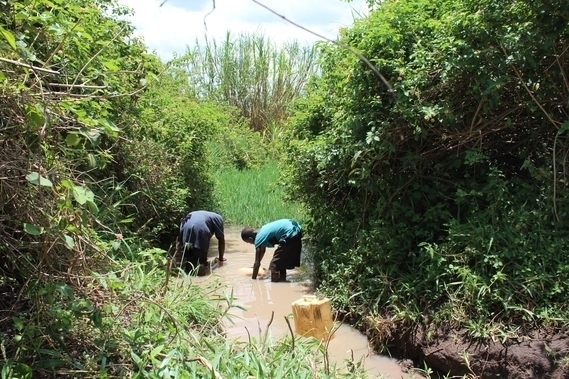
Water, key to compliance with the United Nation’s Sustainable Development Goals
08 of November of 2016
The United Nation’s Sustainable Development Goals (SDGs) are already one year old. They are a framework within which all countries must work together in order to help transform the world. If the UN were a company (multinational or not), the SDGs would represent its Strategic Plan, with a vision, mission and values to be included within a Dashboard with management indicators for evaluating progress, or otherwise assessing deviations from expected results to take the necessary corrective measures. Every department (just like every country) is responsible for its own contribution to the planet’s common good (or the company’s sustainability).
One of the SDGs is water. The UN’s Goal number 6 aims to ensure availability and sustainable management of water and sanitation for all. Nobody can be left behind. Today, 740 million people lack access to drinking water, and 2.5 billion lack access to decent sanitation. The first of the keys is achieving universal and equal access to drinking water and appropriate hygiene and sanitation services for all at an affordable price.
Many countries, however, are currently at war. And water then becomes of paramount importance. Its value skyrockets above that of other commodities such as oil. Water is a matter of life and death. The United Nations Children’s Fund, Unicef, has claimed that the war in Syria has destroyed the pumping station at Bab al-Nayrab, one of nine historical gates leading into the old town of Aleppo. Some 250,000 people are caught in the crossfire between factions loyal to the current regime and rebels opposing it, and 1.5 million suffer interruptions in their water supplies, with the quality of the water deteriorating rapidly. The Suleiman al-Halabi station suffered a similar fate. The well available to the population is hardly an alternative, as the water is polluted.
With or without war, 1 billion people continue to practice open defecation worldwide, nine out of every ten in rural areas, an unhealthy and unhygienic practice (SDG 3). Special attention must be paid to the needs of women and girls and vulnerable people. This correlates directly with other SDGs: the reason for many girls staying out of school (SDG 4) is the fact that they must walk long distances every day to collect water, a time when they are most vulnerable to any type of violence (SDG 5).
Reducing pollution, proper waste disposal and a reduction in the discharge of dangerous chemical materials and products is essential for improving water quality. This, together with a 50% reduction in the volumes of water that go untreated and substantially increasing recycling and reuse under safe conditions.
Many companies have already got down to work. The Children’s Safe Drinking Water (CSDW) Programme implemented by Procter & Gamble (P&G) has distributed 10 billion litres of drinking water since 2004, together with third sector and other public and private sector companies from different countries. Current technology for purifying water is accessible, and the only reasons why it may not be implemented are cultural, logistical or political. Safe drinking water is the one crucial element that will improve the health of a large part of the world’s population (SDG 3), helping children to go to school and providing economic opportunities for the family. In the case of P&G, it’s R&D+I department used research on their core business product (soaps) to condense, within a small sachet the size of a teabag, a technology as powerful as that of a water treatment and purification plant. A technology which is extremely easy to use: with a bucket, a spoon, a piece of cloth and one of P&G’s small water purifying sachets, 10 litres of dirty water can become drinking water in 30 minutes. This amount of water is enough to cover the needs of a family of five for one day.
Another milestone would be to significantly increase efficient use of water resources in all sectors and ensure sustainability of extraction and supply of drinking water to counter water scarcity and thereby substantially reduce the number of people lacking adequate access to water. Large water consumers are agriculture (70%), industry (20%) and cities (10%). Priorities regarding prioritising policies in this respect are obvious, more so because they provide an opportunity to diversify the diet of thousands of people, and restoring the balance between rich and poor (SDG 2).
Implementing integrated management of water resources and protecting and restoring water-related ecosystems (forest, mountains, wetlands, rivers, aquifers and lakes) can only be done if there is cross-border cooperation. This same approach should be used to develop a water-related culture and infrastructures (sanitation, collection and storage, desalination, wastewater treatment, recycling and reuse technologies, monitoring, etc.). Private initiatives should sit alongside public programmes in a stable legal framework. The UN also stresses the essential role of local entrepreneurs and the communities where such policies would be implemented.

Ferrovial and Ayuda en Acción are an example of cooperation in Colombia (SDG 17). Both will together restore and expand the water supply system for El Salado in the framework of an ambitious territorial integration plan linked to the return of the population affected by the civil war in 2000. A water system for human consumption will also be built in San Vicente de Chucurí. Another will be built in Paccha (Peru) with the Anesvad Foundation. In Buyende (Uganda), new drinking water wells will be dug and others improved together with Plan International. Some 17,000 people will see their living conditions improve through these four projects. Since 2008, Ferrovial has invested 3.6 million euros in securing access to drinking water for 163,000 people in several African and Latin American countries. Ferrovial employees also contribute to these projects by donating part of their salary (with Ferrovial doubling the total collected) and by working as volunteers to provide technical assistance at different stages of the projects.
Read more on the Ferrovial Blog about The UN and businesses working together to define Sustainable Development Goals and how Ferrovial was awarded a United Nations Global Compact Award in Australia for its social investment programs.





There are no comments yet